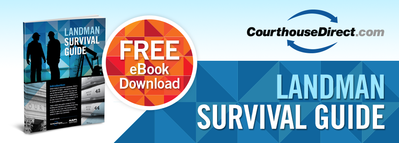
Landmen in the oil and gas industry are those individuals who work as title abstractors, as well as in land acquisition and asset management, and research. In short, a landman is a researcher and negotiator. They analyze tremendous amounts of data and are near experts in property law.
As with any profession, landmen have their share of challenges on the job. The rest of this post goes into a non-comprehensive list of some of those challenges. If you are thinking of becoming a landman, you should continue reading to determine if this is the right job for you.
Challenge: Getting the Job
Many landmen work as independent contractors, so the first order of business is to sell your services. The competition is out there, but it isn't impossible to get someone to hire you as a contractor or full-time employee.
When you are entering the field, do so after passing an educational program that rounds out any other experience you may have in the industry. For example, if you are an attorney, an AAPL Certification can indicate your commitment and proficiency in the field, while you bring experience from the application of the law in various situations.
Once you have your certification in hand, develop a customized resumé that highlights your abilities in the specific areas the employer or company is looking for. As you perform as a landman and gain experience, your resume will tell more about you as a professional and less as a student.
As you move through life, build relationships with others in the oil and gas industry, perform with excellence to earn referrals, and continue to add to your education and professional practice.
Challenge: Working in the Field
Landmen can work in-house from an office, which is just like many other types of jobs, or they can work in the field. Fieldwork offers an array of challenges. You never know exactly where you may end up, but it probably won't be at home all the time. So you have to get tips from others and make some decisions.
- Where to stay while in the area.
- Where to eat. You shouldn't eat fast food all the time.
- Where and what to cook. Some residential type hotels have small kitchen galleys, so you don't have to rely on restaurants.
- How to survive the long drives. Owners and county courthouses range all across an area. You may be in the car for long periods.
- How to keep your identity safe. When you work in places with free Wi-Fi and use your credit card extensively, you have a better than even chance of having enough of your data exposed to bad actors who steal your identity and ruin your credit rating.
Speak with other landmen about their strategies for living on the road, and talk to company people in the area to find acceptable lodgings and good places to eat. Protect your identity as well as you can and keep an eye on your financial data to catch any theft early.
Challenge: Staying Organized
There are a lot of details in negotiating leases and performing research. Without a system in place to help you keep track of all the steps, you may find yourself making expensive errors.
Develop a system, so you know you check off every detail every time. Start by borrowing someone else's system. Over time, you will personalize it and create the best method for you. Repetition will help, but note-taking and checklists can help.
Challenge: Technology
Technology has invaded almost every field. Oil and gas prospecting and leasing are no different. Most of the technology developed recently makes your job a whole lot easier, but you still need to become proficient with the technology and keep up with any changes.
One change for the better is your ability to search courthouse records from the comfort of your home office or hotel room. CourthouseDirect.com provides services that allow you to perform title searches, examine grantor-grantee indexes, and many other courthouse records online, instead of driving to a bunch of county courthouses to check dusty logbooks and dig through files.
Paper and pencil gave way to the typewriter which, in turn, was phased out in favor of a computer. Now you have a device to make phone calls, perform internet searches, and create documents that fit into your pocket.
Challenge: Meeting Your Ethical Obligations
As mentioned before, landmen are salespeople. However, what you are selling can be disorienting and confusing for mineral owners to understand. It would be easy to take advantage of people who are not experienced in lease negotiations, but you must find the line between selling and committing fraud or misrepresentation.
The pressure to get a lease signed or make a deadline can be fierce, but you are the one who will be in hot water if ethical issues arise from the leases you make. Not only that but if you observe someone else who engages in unethical behavior and fail to disclose it could get you caught in a legal net as well.
Run a test on all your approaches to work. Determine whether you are intentionally misleading or misrepresenting facts with the intent to deceive, whether by omission or commission. Did the landowner rely on your information to make decisions? Did you overstate or distort the truth to manipulate the landowner to do what you want?
If so, you are engaged in unethical business practices that are at best misguided and at worst illegal. The American Association of Professional Landmen (AAPL) has a Code of Ethics it expects all members to follow. Use those standards as a litmus test for your practice.
Challenge: The Gender Pay Gap
For female workers, the gender pay gap is still real, and it tends to be worse in professions dominated by men. There is an imbalance in the ratio of men to women in the oil and gas industry that seems to fuel part of the compensation gap.
AAPL salary surveys find that women have been unable to close the pay gap since the surveys began over 25 years ago. In 2017, the gap had increased to $33,622 in annual earnings for exempt employees. In the independent landman category, the gap is $22,079. The difference in compensation likely has many causes, but if you are a woman intending to join the profession, do your research before accepting any position and ask for the payment due to any professional landman of your experience level.
Being a landman can be a rewarding and lucrative profession, especially if you have a degree to back up your certification and experience. Many of the challenges outlined above are valid for almost any profession. But none of the challenges is insurmountable. Learn from more experienced people than yourself, and keep yourself open to learning new things all the time. Then you can meet and beat those challenges as they arise.























